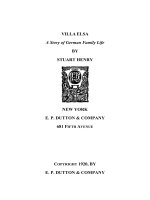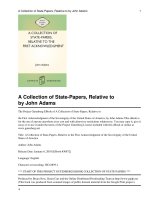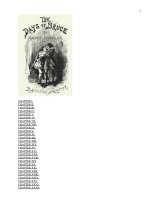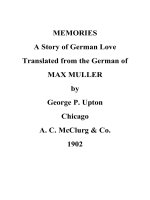A laodicean a story of to day
Bạn đang xem bản rút gọn của tài liệu. Xem và tải ngay bản đầy đủ của tài liệu tại đây (1.37 MB, 336 trang )
TheProjectGutenbergEBookofALaodicean,byThomasHardy
ThiseBookisfortheuseofanyoneanywhereatnocostandwith
almostnorestrictionswhatsoever.Youmaycopyit,giveitawayor
re-useitunderthetermsoftheProjectGutenbergLicenseincluded
withthiseBookoronlineatwww.gutenberg.org
Title:ALaodicean
Author:ThomasHardy
ReleaseDate:February9,2009[EBook#3258]
LastUpdated:October14,2016
Language:English
***STARTOFTHISPROJECTGUTENBERGEBOOKALAODICEAN***
ProducedbyLesBowler,andDavidWidger
ALAODICEAN:ASTORYOFTODAY
ByThomasHardy
Contents
PREFACE.
BOOKTHEFIRST.
GEORGESOMERSET.
BOOKTHESECOND. DAREANDHAVILL.
BOOKTHETHIRD.
DESTANCY.
BOOKTHEFOURTH. SOMERSET,DAREANDDESTANCY.
BOOKTHEFIFTH.
DESTANCYANDPAULA.
BOOKTHESIXTH.
PAULA.
PREFACE.
Thechangingoftheoldorderincountrymanorsandmansionsmaybeslow
or sudden, may have many issues romantic or otherwise, its romantic issues
being not necessarily restricted to a change back to the original order; though
this admissible instance appears to have been the only romance formerly
recognized by novelists as possible in the case. Whether the following
productionbeapictureofotherpossibilitiesornot,itsincidentsmaybetakento
befairlywellsupportedbyevidenceeverydayforthcominginmostcounties.
Thewritingofthetalewasrenderedmemorabletotwopersons,atleast,bya
tediousillnessoffivemonthsthatlaidholdoftheauthorsoonafterthestorywas
begun in a well-known magazine; during which period the narrative had to be
strenuouslycontinuedbydictationtoapredeterminedcheerfulending.
AssomeofthesenovelsofWessexlifeaddressthemselvesmoreespeciallyto
readersintowhosesoulstheironhasentered,andwhoseyearshavelesspleasure
inthemnowthanheretofore,so“ALaodicean”mayperhapshelptowhileaway
an idle afternoon of the comfortable ones whose lines have fallen to them in
pleasantplaces;aboveall,ofthatlargeandhappysectionofthereadingpublic
which has not yet reached ripeness of years; those to whom marriage is the
pilgrim’sEternalCity,andnotamilestoneontheway.T.H.
January1896.
BOOKTHEFIRST.GEORGESOMERSET.
I.
Thesunblazeddownanddown,tillitwaswithinhalf-an-hourofitssetting;
but the sketcher still lingered at his occupation of measuring and copying the
chevroned doorway—a bold and quaint example of a transitional style of
architecture,whichformedthetowerentrancetoanEnglishvillagechurch.The
graveyard being quite open on its western side, the tweed-clad figure of the
youngdraughtsman,andthetallmassofantiquemasonrywhichroseabovehim
toabattlementedparapet,werefiredtoagreatbrightnessbythesolarrays,that
crossed the neighbouring mead like a warp of gold threads, in whose mazes
groupsofequallylustrousgnatsdancedandwailedincessantly.
Hewassoabsorbedinhispursuitthathedidnotmarkthebrilliantchromatic
effectofwhichhecomposedthecentralfeature,tillitwasbroughthometohis
intelligence by the warmth of the moulded stonework under his touch when
measuring;whichledhimatlengthtoturnhisheadandgazeonitscause.
There are few in whom the sight of a sunset does not beget as much
meditativemelancholyascontemplativepleasure,thehumandeclineanddeath
thatitillustratesbeingtooobvioustoescapethenoticeofthesimplestobserver.
Thesketcher,asifhehadbeenbroughttothisreflectionmanyhundredsoftimes
beforebythesamespectacle,showedthathedidnotwishtopursueitjustnow,
by turning away his face after a few moments, to resume his architectural
studies.
Hetookhismeasurementscarefully,andasifhereverencedtheoldworkers
whosetrickhewasendeavouringtoacquiresixhundredyearsaftertheoriginal
performancehadceasedandtheperformerspassedintotheunseen.Bymeansof
astripofleadcalledaleadentape,whichhepressedaroundandintothefillets
andhollowswithhisfingerandthumb,hetransferredtheexactcontourofeach
mouldingtohisdrawing,thatlayonasketching-stoolafewfeetdistant;where
were also a sketching-block, a small T-square, a bow-pencil, and other
mathematical instruments. When he had marked down the line thus fixed, he
returnedtothedoorwaytocopyanotherasbefore.
It being the month of August, when the pale face of the townsman and the
strangeristobeseenamongthebrownskinsofremotestuplanders,notonlyin
England, but throughout the temperate zone, few of the homeward-bound
labourers paused to notice him further than by a momentary turn of the head.
They had beheld such gentlemen before, not exactly measuring the church so
accuratelyasthisoneseemedtobedoing,butpaintingitfromadistance,orat
leastwalkingroundthemouldypile.Atthesametimethepresentvisitor,even
exteriorly,wasnotaltogethercommonplace.Hisfeaturesweregood,hiseyesof
thedarkdeepsortcalledeloquentbythesexthatoughttoknow,andwiththat
rayoflightinthemwhichannouncesaheartsusceptibletobeautyofallkinds,—
inwoman,inart,andininanimatenature.Thoughhewouldhavebeenbroadly
characterized as a young man, his face bore contradictory testimonies to his
preciseage.Thiswasconceivablyowingtoatoodominantspeculativeactivity
inhim,which,whileithadpreservedtheemotionalsideofhisconstitution,and
with it the significant flexuousness of mouth and chin, had played upon his
foreheadandtemplestill,atwearymoments,theyexhibitedsometracesofbeing
over-exercised. A youthfulness about the mobile features, a mature forehead—
thoughnotexactlywhattheworldhasbeenfamiliarwithinpastages—isnow
growing common; and with the advance of juvenile introspection it probably
must grow commoner still. Briefly, he had more of the beauty—if beauty it
oughttobecalled—ofthefuturehumantypethanofthepast;butnotsomuchas
tomakehimotherthananiceyoungman.
His build was somewhat slender and tall; his complexion, though a little
browned by recent exposure, was that of a man who spent much of his time
indoors. Of beard he had but small show, though he was as innocent as a
Nazarite of the useoftherazor;buthepossessed amoustache all-sufficientto
hide the subtleties of his mouth, which could thus be tremulous at tender
momentswithoutprovokinginconvenientcriticism.
Owing to his situation on high ground, open to the west, he remained
envelopedin thelingeringaureate hazetilla time when theeastern part ofthe
churchyardwasinobscurity,anddampwithrisingdew.Whenitwastoodarkto
sketchfurtherhepackeduphisdrawing,and,beckoningtoaladwhohadbeen
idlingbythegate,directedhimtocarrythestoolandimplementstoaroadside
inn which he named, lying a mile or two ahead. The draughtsman leisurely
followed the lad out of the churchyard, and along a lane in the direction
signified.
ThespectacleofasummertravellerfromLondonsketchingmediaevaldetails
intheseneo-Pagandays,whenalullhascomeoverthestudyofEnglishGothic
architecture,throughare-awakeningtotheart-formsoftimesthatmorenearly
neighbourourown,isaccountedforbythefactthatGeorgeSomerset,sonofthe
Academician of that name, was a man of independent tastes and excursive
instincts, who unconsciously, and perhaps unhappily, took greater pleasure in
floatinginlonelycurrentsofthoughtthanwiththegeneraltideofopinion.When
quite a lad, in the days of the French Gothic mania which immediately
succeeded to the great English-pointed revival under Britton, Pugin, Rickman,
Scott, and other mediaevalists, he had crept away from the fashion to admire
whatwasgoodinPalladianandRenaissance.AssoonasJacobean,QueenAnne,
andkindredaccretionsofdecayedstylesbegantobepopular,hepurchasedsuch
old-school works as Revett and Stuart, Chambers, and the rest, and worked
diligently at the Five Orders; till quite bewildered on the question of style, he
concludedthatallstyleswereextinct,andwiththemallarchitectureasaliving
art.Somersetwasnotoldenoughatthattimetoknowthat,inpractice,arthadat
alltimesbeenasfullofshiftsandcompromisesaseveryothermundanething;
that ideal perfection was never achieved by Greek, Goth, or Hebrew Jew, and
never would be; and thus he was thrown into a mood of disgust with his
profession, from which mood he was only delivered by recklessly abandoning
thesestudiesandindulginginanoldenthusiasmforpoeticalliterature.Fortwo
wholeyearshedidnothingbutwriteverseineveryconceivablemetre,andon
every conceivable subject, from Wordsworthian sonnets on the singing of his
tea-kettletoepicfragmentsontheFallofEmpires.Hisdiscoveryattheageof
five-and-twentythattheseinspiredworkswerenotjumpedatbythepublishers
with all the eagerness they deserved, coincided in point of time with a severe
hint from his father that unless he went on with his legitimate profession he
might have to look elsewhere than at home for an allowance. Mr. Somerset
juniorthenawoketorealities,becameintentlypractical,rushedbacktohisdusty
drawing-boards,andworkedupthestylesanew,withaviewofregularlystarting
inpracticeonthefirstdayofthefollowingJanuary.
Itisanoldstory,andperhapsonlydeservesthelighttoneinwhichthesoaring
ofayoungmanintotheempyrean,andhisdescentagain,isalwaysnarrated.But
ashasoftenbeensaid,thelightandthetruthmaybeonthesideofthedreamer:
afarwiderviewthanthewiseoneshavemaybehisatthatrecalcitranttime,and
his reduction to common measure be nothing less than a tragic event. The
operationcalledlunging,inwhichahalteredcoltismadetotrotroundandround
a horsebreaker who holds the rope, till the beholder grows dizzy in looking at
them, is a very unhappy one for the animal concerned. During its progress the
coltspringsupward,acrossthecircle,stops,fliesovertheturfwiththevelocity
ofabird,andindulgesinallsortsofgracefulantics;buthealwaysendsinone
way—thankstotheknottedwhipcord—inaleveltrotroundthelungerwiththe
regularityofahorizontalwheel,andinthelossforevertohischaracterofthe
bold contours which the fine hand of Nature gave it. Yet the process is
consideredtobethemakingofhim.
Whether Somerset became permanently made under the action of the
inevitablelunge,orwhetherhelapsedintomeredabblingwiththeartisticsideof
his profession only, it would be premature to say; but at any rate it was his
contrite return to architecture as a calling that sent him on the sketching
excursionundernotice.Feelingthatsomethingstillwaswantingtoroundoffhis
knowledgebeforehecouldtakehisprofessionallinewithconfidence,hewasled
torememberthathisownnativeGothicwastheoneformofdesignthathehad
totally neglected from the beginning, through its having greeted him with
wearisome iteration at the opening of his career. Now it had again returned to
silence;indeed—such is the surprisinginstabilityofart‘principles’astheyare
facetiously called—it was just as likely as not to sink into the neglect and
oblivionwhichhadbeenitslotinGeorgiantimes.Thisaccidentofbeingoutof
vogue lent English Gothic an additional charm to one of his proclivities; and
awayhewenttomakeitthebusinessofasummercircuitinthewest.
The quiet time of evening, the secluded neighbourhood, the unusually
gorgeousliveriesofthecloudspackedinapileoverthatquarteroftheheavens
inwhichthesunhaddisappeared,weresuchastomakeatravellerloiteronhis
walk.Comingtoastile,Somersetmountedhimselfonthetopbar,toimbibethe
spirit of the scene and hour. The evening was so still that every trifling sound
couldbeheardformiles.Therewastherattleofareturningwaggon,mixedwith
thesmacksofthewaggoner’swhip:theteammusthavebeenatleastthreemiles
off. From far over the hill came the faint periodic yell of kennelled hounds;
while from the nearest village resounded the voices of boys at play in the
twilight.Thenapowerfulclockstruckthehour;itwasnotfromthedirectionof
thechurch,butratherfromthewoodbehindhim;andhethoughtitmustbethe
clockofsomemansionthatway.
But the mind of man cannot always be forced to take up subjects by the
pressure of their material presence, and Somerset’s thoughts were often, to his
greatloss,apttobeevenmorethancommontruantsfromthetonesandimages
that met his outer senses on walks and rides. He would sometimes go quietly
throughthequeerest,gayest,mostextraordinarytowninEurope,andletitalone,
provideditdidnotmeddlewithhimbyitsbeggars,beauties,innkeepers,police,
coachmen, mongrels, bad smells, and such like obstructions. This feat of
questionableutilityhebeganperformingnow.Sittingonthethree-inchashrail
that had been peeled and polished like glass by the rubbings of all the smallclothesintheparish,heforgotthetime,theplace,forgotthatitwasAugust—in
short, everything of the present altogether. His mind flew back to his past life,
anddeploredthewasteoftimethathadresultedfromhisnothavingbeenableto
makeuphismindwhichofthemanyfashionsofartthatwerecomingandgoing
in kaleidoscopic change was the true point of departure from himself. He had
sufferedfromthemodernmaladyofunlimitedappreciativenessasmuchasany
livingmanofhisownage.Dozensofhisfellowsinyearsandexperience,who
had never thought specially of the matter, but had blunderingly applied
themselves to whatever form of art confronted them at the moment of their
makingamove,werebythistimeacquiringrenownasnewlights;whilehewas
still unknown. He wished that some accident could have hemmed in his eyes
betweeninexorableblinkers,andspedhimoninachanneleversoworn.
Thusbalancedbetweenbelievingandnotbelievinginhisownfuture,hewas
recalledtothescenewithoutbyhearingthenotesofafamiliarhymn,risingin
subduedharmoniesfromavalleybelow.Helistenedmoreheedfully.Itwashis
oldfriendthe‘NewSabbath,’whichhehadneveronceheardsincethelisping
daysofchildhood,andwhoseexistence,muchasithadthenbeentohim,hehad
till this moment quite forgotten. Where the ‘New Sabbath’ had kept itself all
these years—why that sound and hearty melody had disappeared from all the
cathedrals, parish churches, minsters and chapels-of-ease that he had been
acquaintedwithduringhisapprenticeshiptolife,anduntilhiswayshadbecome
irregular and uncongregational—he could not, at first, say. But then he
recollected that the tune appertained to the old west-gallery period of churchmusic, anterior to the great choral reformation and the rule of Monk—that old
timewhentherepetitionofaword,orhalf-lineofaverse,wasnotconsidereda
disgracetoanecclesiasticalchoir.
Willing to be interested in anything which would keep him out-of-doors,
Somersetdismountedfromthestileanddescendedthehillbeforehim,tolearn
whencethesingingproceeded.
II.
He found that it had its origin in a building standing alone in a field; and
thoughtheeveningwasnotyetdarkwithout,lightsshonefromthewindows.In
a few moments Somerset stood before the edifice. Being just then en rapport
with ecclesiasticism by reason of his recent occupation, he could not help
murmuring,‘ShadeofPugin,whatamonstrosity!’
Perhaps this exclamation (rather out of date since the discovery that Pugin
himselfoftennoddedamazingly)wouldnothavebeenindulgedinbySomerset
but for his new architectural resolves, which caused professional opinions to
advance themselves officiously to his lips whenever occasion offered. The
buildingwas,inshort,arecently-erectedchapelofredbrick,withpseudo-classic
ornamentation,andthewhiteregularjointsofmortarcouldbeseenstreakingits
surfaceingeometricaloppressivenessfromtoptobottom.Theroofwasofblue
slate, clean as a table, and unbroken from gable to gable; the windows were
glazed with sheets of plate glass, a temporary iron stovepipe passing out near
oneofthese,andrunninguptotheheightoftheridge,whereitwasfinishedbya
covering like a parachute. Walking round to the end, he perceived an oblong
white stone let into the wall just above the plinth, on which was inscribed in
deepletters:—
Erected187-,
ATTHESOLEEXPENSEOF
JOHNPOWER,ESQ.,M.P.
The‘NewSabbath’stillproceededlinebyline,withalltheemotionalswells
and cadences that had of old characterized the tune: and the body of vocal
harmony that it evoked implied a large congregation within, to whom it was
plainly as familiar as it had been to church-goers of a past generation. With a
whimsical sense of regret at the secession of his once favourite air Somerset
movedaway,andwouldhavequitewithdrawnfromthefieldhadhenotatthat
moment observed two young men with pitchers of water coming up from a
streamhardby,andhasteningwiththeirburdensintothechapelvestrybyaside
door. Almost as soon as they had entered they emerged again with empty
pitchers,andproceededtothestreamtofillthemasbefore,anoperationwhich
theyrepeatedseveraltimes.Somersetwentforwardtothestream,andwaitedtill
theyoungmencameoutagain.
‘Youarecarryinginagreatdealofwater,’hesaid,aseachdippedhispitcher.
One of the young men modestly replied, ‘Yes: we filled the cistern this
morning;butitleaks,andrequiresafewpitcherfulsmore.’
‘Whydoyoudoit?’
‘Thereistobeabaptism,sir.’
Somersetwasnotsufficientlyinterestedtodevelopafurtherconversation,and
observingtheminsilencetilltheyhadagainvanishedintothebuilding,hewent
on his way. Reaching the brow of the hill he stopped and looked back. The
chapel was still in view, and the shades of night having deepened, the lights
shone from the windows yet more brightly than before. A few steps further
would hide them and the edifice, and all that belonged to it from his sight,
possiblyforever.Therewassomethinginthethoughtwhichledhimtolinger.
Thechapelhadneitherbeauty,quaintness,norcongenialitytorecommendit:the
dissimilitude between the new utilitarianism of the place and the scenes of
venerable Gothic art which had occupied his daylight hours could not well be
exceeded. But Somerset, as has been said, was an instrument of no narrow
gamut:hehadakeyforothertouchesthanthepurelyaesthetic,evenonsuchan
excursionasthis.Hismindwasarrestedbytheintenseandbusyenergywhich
must needs belong to an assembly that required such a glare of light to do its
religionby;intheheavingofthattunetherewasanearnestnesswhichmadehim
thoughtful, and the shine of those windows he had characterized as ugly
reminded him of the shining of the good deed in a naughty world. The chapel
anditsshabbyplotofground,fromwhichtheherbagewasalltroddenawayby
busyfeet,hadalivinghumaninterestthatthenumerousminstersandchurches
knee-deep in fresh green grass, visited by him during the foregoing week, had
often lacked. Moreover, there was going to be a baptism: that meant the
immersionofagrown-upperson;andhehadbeentoldthatBaptistswereserious
peopleandthatthescenewasmostimpressive.Whatmannerofmanwoulditbe
who on an ordinary plodding and bustling evening of the nineteenth century
couldsinglehimselfoutasonedifferentfromtherestoftheinhabitants,banish
allshyness,andcomeforwardtoundergosuchatryingceremony?Whowashe
that had pondered, gone into solitudes, wrestled with himself, worked up his
courageandsaid,Iwilldothis,thoughfewelsewill,forIbelieveittobemy
duty?
Whetheronaccountofthesethoughts,orfromthecircumstancethathe had
been alone amongst the tombs all day without communion with his kind, he
couldnottellinafteryears(whenhehadgoodreasontothinkofthesubject);
butsoitwasthatSomersetwentback,andagainstoodunderthechapel-wall.
Insteadofenteringhepassedroundtowherethestove-chimneycamethrough
the bricks, and holding on to the iron stay he put his toes on the plinth and
lookedinatthewindow.Thebuildingwasquitefullofpeoplebelongingtothat
vast majority of society who are denied the art of articulating their higher
emotions, and crave dumbly for a fugleman—respectably dressed working
people,whosefacesandformswerewornandcontortedbyyearsofdrearytoil.
Onaplatformattheendofthechapelahaggardmanofmorethanmiddleage,
withgreywhiskersasceticallycutbackfromtheforepartofhisfacesofarasto
bealmostbanishedfromthecountenance,stoodreadingachapter.Betweenthe
minister and the congregation was an open space, and in the floor of this was
sunkatankfullofwater,whichjustmadeitssurfacevisibleabovetheblackness
ofitsdepthsbyreflectingthelightsoverhead.
Somersetendeavouredtodiscoverwhichoneamongtheassemblagewastobe
thesubjectoftheceremony.Butnobodyappearedtherewhowasatalloutofthe
region of commonplace. The people were all quiet and settled; yet he could
discern on their faces something more than attention, though it was less than
excitement: perhaps it was expectation. And as if to bear out his surmise he
heardatthatmomentthenoiseofwheelsbehindhim.
Hisgazeintothelightedchapelmadewhathadbeenaneveningscenewhen
helookedawayfromthelandscapenightitselfonlookingback;buthecouldsee
enoughtodiscoverthatabroughamhaddrivenuptotheside-doorusedbythe
young water-bearers, and that a lady in white-and-black half-mourning was in
theactofalighting,followedbywhatappearedtobeawaiting-womancarrying
wraps.Theyenteredthevestry-roomofthechapel,andthedoorwasshut.The
servicewentonasbeforetillatacertainmomentthedoorbetweenvestryand
chapel was opened, when a woman came out clothed in an ample robe of
flowing white, which descended to her feet. Somerset was unfortunate in his
position;hecouldnotseeherface,buthergaitsuggestedatoncethatshewas
theladywhohadarrivedjustbefore.Shewasrathertallthanotherwise,andthe
contour of her head and shoulders denoted a girl in the heyday of youth and
activity. His imagination, stimulated by this beginning, set about filling in the
meagreoutlinewithmostattractivedetails.
Shestooduponthebrinkofthepool,andtheministerdescendedthestepsat
itsedgetillthesolesofhisshoesweremoistenedwiththewater.Heturnedto
the young candidate, but she did not follow him: instead of doing so she
remained rigid as a stone. He stretched out his hand, but she still showed
reluctance,till,withsomeembarrassment,hewentback,andspokesoftlyinher
ear.
Sheapproachedtheedge,lookedintothewater,andturnedawayshakingher
head.Somersetcouldforthefirsttimeseeherface.Thoughhumanlyimperfect,
asiseveryfacewesee,itwasonewhichmadehimthinkthatthebestinwomankindnolessthanthebestinpsalm-tuneshadgoneovertotheDissenters.Hehad
certainlyseennobodysointerestinginhistourhitherto;shewasabouttwentyor
twenty-one—perhaps twenty-three, for years have a way of stealing marches
even upon beauty’s anointed. The total dissimilarity between the expression of
her lineaments and that of the countenances around her was not a little
surprising, and was productive of hypotheses without measure as to how she
came there. She was, in fact, emphatically a modern type of maidenhood, and
she looked ultra-modern by reason of her environment: a presumably
sophisticatedbeingamongthesimpleones—notwickedlyso,butonewhoknew
life fairly well for her age. Her hair, of good English brown, neither light nor
dark,wasabundant—tooabundantforconvenienceintying,asitseemed;andit
threwoffthelamp-lightinahazylustre.Andthoughitcouldnotbesaidofher
features that this or that was flawless, the nameless charm of them altogether
wasonlyanotherinstanceofhowbeautifulawomancanbeasawholewithout
attaining in any one detail to the lines marked out as absolutely correct. The
spiritandthelifewerethere:andmaterialshapescouldbedisregarded.
Whatever moral characteristics this might be the surface of, enough was
shown to assure Somerset that she had some experience of things far removed
from her present circumscribed horizon, and could live, and was even at that
momentliving,aclandestine,stealthyinnerlifewhichhadverylittletodowith
her outward one. The repression of nearly every external sign of that distress
under which Somerset knew, by a sudden intuitive sympathy, that she was
labouring,addedstrengthtotheseconvictions.
‘And you refuse?’ said the astonished minister, as she still stood immovable
onthebrinkofthepool.Hepersuasivelytookhersleevebetweenhisfingerand
thumb as if to draw her; but she resented this by a quick movement of
displeasure,andhereleasedher,seeingthathehadgonetoofar.
‘But, my dear lady,’ he said, ‘you promised! Consider your profession, and
thatyoustandintheeyesofthewholechurchasanexemplarofyourfaith.’
‘Icannotdoit!’
‘Butyourfather’smemory,miss;hislastdyingrequest!’
‘Icannothelpit,’shesaid,turningtogetaway.
‘YoucameherewiththeintentiontofulfiltheWord?’
‘ButIwasmistaken.’
‘Thenwhydidyoucome?’
Shetacitlyimpliedthattobeaquestionshedidnotcaretoanswer.‘Pleasesay
nomoretome,’shemurmured,andhastenedtowithdraw.
Duringthisunexpecteddialogue(whichhadreachedSomerset’searsthrough
the open windows) that young man’s feelings had flown hither and thither
between minister and lady in a most capricious manner: it had seemed at one
momentaratheruncivilthingofher,charmingasshewas,togivetheminister
and the water-bearers so much trouble for nothing; the next, it seemed like
revivingtheancientcrueltiesoftheducking-stooltotrytoforceagirlintothat
darkwaterifshehadnotamindtoit.Buttheministerwasnotwithoutinsight,
and he had seen that it would be useless to say more. The crestfallen old man
hadtoturnrounduponthecongregationanddeclareofficiallythatthebaptism
waspostponed.
Shepassedthroughthedoorintothevestry.Duringtheexcitingmomentsof
herrecusancytherehadbeenaperceptibleflutteramongthesensitivemembers
of the congregation; nervous Dissenters seeming to be at one with nervous
Episcopaliansinthisatleast,thattheyheartilydislikedasceneduringservice.
Calmwasrestoredtotheirmindsbytheministerstartingaratherlonghymnin
minimsandsemibreves,amidthesingingofwhichheascendedthepulpit.His
face had a severe and even denunciatory look as he gave out his text, and
Somersetbegantounderstandthatthismeantmischieftotheyoungpersonwho
hadcausedthehitch.
‘InthethirdchapterofRevelationandthefifteenthandfollowingverses,you
willfindthesewords:—
‘“Iknowthyworks,thatthouartneithercoldnorhot:Iwouldthouwertcold
orhot.Sothenbecausethouartlukewarm,andneithercoldnorhot,Iwillspue
theeoutofmymouth....Thousayest,Iamrich,andincreasedwithgoods,and
have need of nothing; and knowest not that thou art wretched, and miserable,
andpoor,andblind,andnaked.”’
Thesermonstraightwaybegan,anditwassoonapparentthatthecommentary
wastobenolessforciblethanthetext.Itwasalsoapparentthatthewordswere,
virtually,notdirectedforwardinthelineinwhichtheywereuttered,butthrough
the chink of the vestry-door, that had stood slightly ajar since the exit of the
young lady. The listeners appeared to feel this no less than Somerset did, for
their eyes, one and all, became fixed upon that vestry door as if they would
almost push it open by the force of their gazing. The preacher’s heart was full
and bitter; no book or note was wanted by him; never was spontaneity more
absolutethanhere.Itwasnotimidreproofoftheornamentalkind,butadirect
denunciation, all the more vigorous perhaps from the limitation of mind and
languageunderwhichthespeakerlaboured.Yet,foolthathehadbeenmadeby
thecandidate,therewasnothingacridinhisattack.Genuineflashesofrhetorical
fire were occasionally struck by that plain and simple man, who knew what
straightforwardconductwas,andwhodidnotknowtheillimitablecapriceofa
woman’smind.
Atthismomenttherewasnotinthewholechapelapersonwhoseimagination
was not centred on what was invisibly taking place within the vestry. The
thunderoftheminister’seloquenceechoed,ofcourse,throughtheweaksister’s
cavern of retreat no less than round the public assembly. What she was doing
inside there—whether listening contritely, or haughtily hastening to put on her
things and get away from the chapel and all it contained—was obviously the
thoughtofeachmember.Whatchangesweretracingthemselvesuponthatlovely
face:diditrisetophasesofRaffaelesqueresignationorsinksolowastoflush
and frown? was Somerset’s inquiry; and a half-explanation occurred when,
duringthediscourse,thedoorwhichhadbeenajarwasgentlypushedto.
Lookingonasastrangeritseemedtohimmorethanprobablethatthisyoung
woman’s power of persistence in her unexpected repugnance to the rite was
strengthenedbywealthandpositionofsomesort,andwasnottheunassistedgift
of nature. The manner of her arrival, and her dignified bearing before the
assembly, strengthened the belief. A woman who did not feel something
extraneoustohermentalselftofallbackuponwouldbesofaroverawedbythe
peopleandthecrisisasnottoretainsufficientresolutionforachangeofmind.
Thesermonended,theministerwipedhissteamingfaceandturneddownhis
cuffs,andnodsandsagaciousglanceswentround.Yetmany,evenofthosewho
hadpresumablypassedthesameordealwithcredit,exhibitedgentlerjudgment
than the preacher’s on a tergiversation of which they had probably recognized
somegermintheirownbosomswheninthelady’ssituation.
ForSomersettherewasbutonescene:theimaginedsceneofthegirlherself
asshesataloneinthevestry.Theferventcongregationrosetosingagain,and
thenSomersetheardaslightnoiseonhislefthandwhichcausedhimtoturnhis
head.Thebrougham,whichhadretiredintothefieldtowait,wasbackagainat
the door: the subject of his rumination came out from the chapel—not in her
mysticrobeofwhite,butdressedinordinaryfashionablecostume—followedas
beforebytheattendantwithotherarticlesofclothingonherarm,includingthe
whitegown.Somersetfanciedthattheyoungerwomanwasdryinghereyeswith
herhandkerchief,buttherewasnotmuchtimetosee:theyquicklyenteredthe
carriage, and it moved on. Then a cat suddenly mewed, and he saw a white
Persianstandingforlornwherethecarriagehadbeen.Thedoorwasopened,the
cattakenin,andthecarriagedroveaway.
The stranger’s girlish form stamped itself deeply on Somerset’s soul. He
strolledonhiswayquiteoblivioustothefactthatthemoonhadjustrisen,and
that the landscape was one for him to linger over, especially if there were any
Gothicarchitectureinthelineofthelunarrays.Theinferencewasthatthough
this girl must be of a serious turn of mind, wilfulness was not foreign to her
composition: and it was probable that her daily doings evinced without much
abatementbyreligiontheunbrokenspiritandprideoflifenaturaltoherage.
ThelittlevillageinnatwhichSomersetintendedtopassthenightlayamile
furtheron,andretracinghiswayuptothestileherambledalongthelane,now
beginningtobestreakedlikeazebrawiththeshadowsofsomeyoungtreesthat
edgedtheroad.Buthisattentionwasattractedtotheothersideofthewaybya
hum as of a night-bee, which arose from the play of the breezes over a single
wireoftelegraphrunningparallelwithhistrackontallpolesthathadappeared
bytheroad,hehardlyknewwhen,fromabranchroute,probablyleadingfrom
sometownintheneighbourhoodtothevillagehewasapproaching.Hedidnot
knowthepopulationofSleeping-Green,asthevillageofhissearchwascalled,
butthepresenceofthismarkofcivilizationseemedtosignifythatitsinhabitants
werenotquitesofarintherearoftheirageasmightbeimagined;aglanceatthe
stillungrassedheapofearthroundthefootofeachpostwas,however,sufficient
toshowthatitwasatnoveryremoteperiodthattheyhadmadetheiradvance.
AidedbythisfriendlywireSomersethadnodifficultyinkeepinghiscourse,
tillhereachedapointintheascentofahillatwhichthetelegraphbranchedoff
from the road, passing through an opening in the hedge, to strike across an
undulating down, while the road wound round to the left. For a few moments
Somerset doubted and stood still. The wire sang on overhead with dying falls
and melodious rises that invited him to follow; while above the wire rode the
starsintheircourses,thelownocturnoftheformerseemingtobethevoicesof
thosestars,
‘Stillquiringtotheyoung-eyedcherubim.’
RecallinghimselffromthesereflectionsSomersetdecidedtofollowthelead
ofthewire.Itwasnotthefirsttimeduringhispresenttourthathehadfoundhis
way at night by the help of these musical threads which the post-office
authorities had erected all over the country for quite another purpose than to
guidebelatedtravellers.Plungingwithitacrossthedownhecametoahedgeless
road that entered a park or chase, which flourished in all its original wildness.
Tufts of rushes and brakes of fern rose from the hollows, and the road was in
placeshalfovergrownwithgreen,asifithadnotbeentendedformanyyears;so
much so that, where shaded by trees, he found some difficulty in keeping it.
Though he had noticed the remains of a deer-fence further back no deer were
visible,anditwasscarcelypossiblethatthereshouldbeanyintheexistingstate
ofthings:butrabbits weremultitudinous,everyhillockbeingdottedwiththeir
seated figures till Somerset approached and sent them limping into their
burrows. The road next wound round a clump of underwood beside which lay
heapsoffaggotsforburning,andthenthereappearedagainsttheskythewalls
and towers of a castle, half ruin, half residence, standing on an eminence hard
by.
Somersetstoppedtoexamineit.Thecastlewasnotexceptionallylarge,butit
had all the characteristics of its most important fellows. Irregular, dilapidated,
andmuffledincreepersasagreatportionofitwas,somepart—acomparatively
modern wing—was inhabited, for a light or two steadily gleamed from some
upperwindows;inothersareflectionofthemoondenotedthatunbrokenglass
yetfilledtheircasements.Overallrosethekeep,asquaresolidtowerapparently
not much injured by wars or weather, and darkened with ivy on one side,
whereinwingscouldbeheardflappinguncertainly,asiftheybelongedtoabird
unable to find a proper perch. Hissing noises supervened, and then a hoot,
proclaimingthatabroodofyoungowlswereresidingthereinthecompanyof
olderones.Inspiteofthehabitableandmoremodernwing,neglectanddecay
had set their mark upon the outworks of the pile, unfitting them for a more
positivelightthanthatofthepresenthour.
Hewalkeduptoamodernarchspanningtheditch—nowdryandgreen—over
which the drawbridge once had swung. The large door under the porter’s
archway was closed and locked. While standing here the singing of the wire,
whichforthelastfewminuteshehadquiteforgotten,againstruckuponhisear,
andretreatingtoaconvenientplaceheobserveditsfinalcourse:fromthepoles
amidthetreesitleapedacrossthemoat,overthegirdlingwall,andthencebya
tremendous stretch towards the keep where, to judge by sound, it vanished
through an arrow-slit into the interior. This fossil of feudalism, then, was the
journey’s-endofthewire,andnotthevillageofSleeping-Green.
Therewasacertainunexpectednessinthefactthatthehoarymemorialofa
stolidantagonismtotheinterchangeofideas,themonumentofharddistinctions
inbloodandrace,ofdeadlymistrustofone’sneighbourinspiteoftheChurch’s
teaching,andofasublimeunconsciousnessofanyotherforcethanabruteone,
should be the goal of a machine which beyond everything may be said to
symbolize cosmopolitan views and the intellectual and moral kinship of all
mankind.Inthatlightthelittlebuzzingwirehadafarfinersignificancetothe
studentSomersetthanthevastwallswhichneighbouredit.Butthemodernfever
andfretwhichconsumespeoplebeforetheycangrowoldwasalsosignifiedby
the wire; and this aspect of to-day did not contrast well with the fairer side of
feudalism—leisure,light-heartedgenerosity,intensefriendships,hawks,hounds,
revels, healthy complexions, freedom from care, and such a living power in
architecturalartastheworldmayneveragainsee.
Somerset withdrew till neither the singing of the wire nor the hisses of the
irritableowlscouldbeheardanymore.Aclockinthecastlestruckten,andhe
recognized the strokes as those he had heard when sitting on the stile. It was
indispensablethatheshouldretracehisstepsandpushontoSleeping-Greenif
hewishedthatnighttoreachhislodgings,whichhadbeensecuredbyletterata
little inn in the straggling line of roadside houses called by the above name,
wherehisluggagehadbythistimeprobablyarrived.Inaquarterofanhourhe
wasagainatthepointwherethewirelefttheroad,andfollowingthehighway
overahillhesawthehamletathisfeet.
III.
By half-past ten the next morning Somerset was once more approaching the
precinctsofthebuildingwhichhadinterestedhimthenightbefore.Referringto
hismaphehadlearntthatitborethenameofStancyCastleorCastledeStancy;
and he had been at once struck with its familiarity, though he had never
understood its position in the county, believing it further to the west. If report
spoke truly there was some excellent vaulting in the interior, and a change of
studyfromecclesiasticaltosecularGothicwasnotunwelcomeforawhile.
Theentrance-gatewasopennow,andunderthearchwaytheouterwardwas
visible,agreatpartofitbeinglaidoutasaflower-garden.Thiswasinprocessof
clearing from weeds and rubbish by a set of gardeners, and the soil was so
encumbered that in rooting out the weeds such few hardy flowers as still
remainedinthebedsweremostlybroughtupwiththem.Thegroovewhereinthe
portcullishadrunwasasfreshasifonlycutyesterday,theverytoolingofthe
stone being visible. Close to this hung a bell-pull formed of a large wooden
acornattachedtoaverticalrod.Somerset’sapplicationbroughtawomanfrom
theporter’sdoor,whoinformedhimthatthedaybeforehavingbeentheweekly
show-dayforvisitors,itwasdoubtfulifhecouldbeadmittednow.
‘Whoisathome?’saidSomerset.
‘OnlyMissdeStancy,’theporteressreplied.
His dread of being considered an intruder was such that he thought at first
therewasnohelpforitbuttowaittillthenextweek.Buthehadalreadythrough
his want of effrontery lost a sight of many interiors, whose exhibition would
havebeenratherasatisfactiontotheinmatesthanatrouble.Itwasinconvenient
to wait; he knew nobody in the neighbourhood from whom he could get an
introductoryletter:heturnedandpassedthewoman,crossedthewardwherethe
gardeners were at work, over a second and smaller bridge, and up a flight of
stone stairs, open to the sky, along whose steps sunburnt Tudor soldiers and
other renowned dead men had doubtless many times walked. It led to the
principaldooronthisside.Thencehecouldobservethewallsofthelowercourt
in detail, and the old mosses with which they were padded—mosses that from
time immemorial had been burnt brown every summer, and every winter had
grown green again. The arrow-slit and the electric wire that entered it, like a
worm uneasy at being unearthed, were distinctly visible now. So also was the
clock,not,ashehadsupposed,achronometercoevalwiththefortressitself,but
newandshining,andbearingthenameofarecentmaker.
Thedoorwasopenedbyabland,intenselyshavenmanoutoflivery,whotook
Somerset’s name and politely worded request to be allowed to inspect the
architectureofthemorepublicportionsofthecastle.Hepronouncedtheword
‘architecture’inthetoneofamanwhoknewandpractisedthatart;‘for,’hesaid
tohimself,‘ifshethinksIamamereidletourist,itwillnotbesowell.’
No such uncomfortable consequences ensued. Miss De Stancy had great
pleasureingivingMr.Somersetfullpermissiontowalkthroughwhateverparts
ofthebuildinghechose.
Hefollowedthebutlerintotheinnerbuildingsofthefortress,theponderous
thickness of whose walls made itself felt like a physical pressure. An internal
stonestaircase,rangedroundfoursidesofasquare,wasnextrevealed,leadingat
thetopofoneflightintoaspacioushall,whichseemedtooccupythewholearea
of the keep. From this apartment a corridor floored with black oak led to the
moremodernwing,wherelightandairweretreatedinalessgingerlyfashion.
Herepassageswerebroaderthanintheoldestportion,andupholsteryenlisted
intheserviceofthefineartshidtoagreatextentthecoldnessofthewalls.
Somerset was now left to himself, and roving freely from room to room he
foundtimetoinspectthedifferentobjectsofinterestthataboundedthere.Notall
the chambers, even of the habitable division, were in use as dwelling-rooms,
though these were still numerous enough for the wants of an ordinary country
family.Inalonggallerywithacovedceilingofarabesqueswhichhadoncebeen
gilded, hung a series of paintings representing the past personages of the De
Stancy line. It was a remarkable array—even more so on account of the
incrediblyneglectedconditionofthecanvasesthanfortheartisticpeculiarities
they exhibited. Many of the frames were dropping apart at their angles, and
someofthecanvaswassodingythatthefaceofthepersondepictedwasonly
distinguishable as the moon through mist. For the colour they had now they
might have been painted during an eclipse; while, to judge by the webs tying
themtothewall,thespidersthatranupanddowntheirbacksweresuchasto
makethefairoriginalsshudderintheirgraves.
He wondered how many of the lofty foreheads and smiling lips of this
pictorialpedigreecouldbecreditedastruereflectionsoftheirprototypes.Some
werewilfullyfalse,nodoubt;manymoresobyunavoidableaccidentandwant
ofskill.Somersetfeltthatitrequiredaprofoundermindthanhistodisinterfrom
the lumber of conventionality the lineaments that really sat in the painter’s
presence,andtodiscovertheirhistorybehindthecurtainofmeretradition.
The painters of this long collection were those who usually appear in such
places;Holbein,Jansen,andVandyck;SirPeter,SirGeoffrey,SirJoshua,andSir
Thomas. Their sitters, too, had mostly been sirs; Sir William, Sir John, or Sir
George De Stancy—some undoubtedly having a nobility stamped upon them
beyond that conferred by their robes and orders; and others not so fortunate.
Their respective ladies hung by their sides—feeble and watery, or fat and
comfortable, as the case might be; also their fathers and mothers-in-law, their
brothers and remoter relatives; their contemporary reigning princes, and their
intimatefriends.OftheDeStancyspurethereranthroughthecollectionamark
bywhichtheymightsurelyhavebeenrecognizedasmembersofonefamily;this
featurebeingtheupperpartofthenose.Everyone,eveniflackingotherpoints
incommon,hadthespecialindentatthispointintheface—sometimesmoderate
indegree,sometimesexcessive.
Whilelookingatthepictures—which,thoughnotinhisregularlineofstudy,
interested Somerset more than the architecture, because of their singular
dilapidation,itoccurredtohismindthathehadinhisyouthbeenschoolfellow
foraveryshorttimewithapleasantboybearingasurnameattachedtooneof
thepaintings—thenameofRavensbury.Theboyhadvanishedheknewnothow
—he thought he had been removed from school suddenly on account of ill
health. But the recollection was vague, and Somerset moved on to the rooms
aboveandbelow.Inadditiontothearchitecturaldetailsofwhichhehadasyet
obtained but glimpses, there was a great collection of old movables and other
domestic art-work—all more than a century old, and mostly lying as lumber.
There were suites of tapestry hangings, common and fine; green and scarlet
leather-work,onwhichthegildingwasstillbutlittleinjured;venerabledamask
curtains; quilted silk table-covers, ebony cabinets, worked satin windowcushions,carvedbedsteads,andembroideredbed-furniturewhichhadapparently
screened no sleeper for these many years. Downstairs there was also an
interestingcollectionofarmour,togetherwithseveralhugetrunksandcoffers.A
great many of them had been recently taken out and cleaned, as if a long
dormant interest in them were suddenly revived. Doubtless they were those
whichhadbeenusedbythelivingoriginalsofthephantomsthatlookeddown
fromtheframes.
This excellent hoard of suggestive designs for wood-work, metal-work, and
workofothersorts,inducedSomersettodiverthisstudiesfromtheecclesiastical
direction, to acquire some new ideas from the objects here for domestic
application.Yetforthepresenthewasinclinedtokeephis sketch-bookclosed
andhisivoryrulefolded,anddevotehimselftoageneralsurvey.Emergingfrom
theground-floorbyasmalldoorway,hefoundhimselfonaterracetothenortheast,andontheothersidethanthatbywhichhehadentered.Itwasboundedby
a parapet breast high, over which a view of the distant country met the eye,
stretchingfromthefootoftheslopetoadistanceofmanymiles.Somersetwent
and leaned over, and looked down upon the tops of the bushes beneath. The
prospect included the village he had passed through on the previous day: and
amidstthegreenlightsandshadesofthemeadowshecoulddiscerntheredbrick
chapelwhoserecalcitrantinmatehadsoengrossedhim.
Before his attention had long strayed over the incident which romanticized
thatutilitarianstructure,hebecameawarethathewasnottheonlypersonwho
was looking from the terrace towards that point of the compass. At the righthandcorner,inanicheofthecurtain-wall,reclinedagirlishshape;andasleepon
the bench over which she leaned was a white cat—the identical Persian as it
seemed—thathadbeentakenintothecarriageatthechapel-door.
Somerset began to muse on the probability or otherwise of the backsliding
Baptist and this young lady resulting in one and the same person; and almost
withoutknowingithefoundhimselfdeeplyhopingforsuchaunity.Theobject
of his inspection was idly leaning, and this somewhat disguised her figure. It
mighthavebeentallorshort,curvilinearorangular.Shecarriedalightsunshade
whichshefitfullytwirleduntil,thrustingitbackoverhershoulder,herheadwas
revealedsufficientlytoshowthatsheworenohatorbonnet.Thistokenofher
beinganinmateofthecastle,andnotavisitor,ratherdampedhisexpectations:
buthepersistedinbelievingherlooktowardsthechapelmusthaveameaningin
it,tillshesuddenlystooderect,andrevealedherselfasshortinstature—almost
dumpy—atthesametimegivinghimadistinctviewofherprofile.Shewasnot
atallliketheheroineofthechapel.HesawthedintednoseoftheDeStancys
outlined with Holbein shadowlessness against the blue-green of the distant
wood.ItwasnottheDeStancyfacewithallitsoriginalspecialities:itwas,soto
speak,adefectivereprintofthatface:forthenosetriedhardtoturnupanddeal
utterconfusiontothefamilyshape.
Asfortherestofthecountenance,Somersetwasobligedtoownthatitwas
not beautiful: Nature had done there many things that she ought not to have
done,andleftundonemuchthatsheshouldhaveexecuted.Itwouldhavebeen
decidedlyplainbutforapreciousqualitywhichnoperfectionofchisellingcan
givewhenthetemperamentdeniesit,andwhichnofacialirregularitycantake
away—atenderaffectionatenesswhichmightalmostbecalledyearning;suchas
isoftenseeninthewomenofCorreggiowhentheyarepaintedinprofile.Butthe
plain features of Miss De Stancy—who she undoubtedly was—were rather
severely handled by Somerset’s judgment owing to his impression of the
previousnight.Abeautyofasortwouldhavebeenlentbytheflexuouscontours
ofthemobilepartsbutforthatunfortunateconditionthepoorgirlwasburdened
with, of having to hand on a traditional feature with which she did not find
herselfotherwiseinharmony.
Sheglancedathimforamoment,andshowedbyanimperceptiblemovement
that he had made his presence felt. Not to embarrass her Somerset hastened to
withdraw,atthesametimethatshepassedroundtotheotherpartoftheterrace,
followedbythecat,inwhomSomersetcouldimagineacertaindenominational
castofcountenance,notwithstandinghercompany.Butaswhitecatsaremuch
alikeeachotheratadistance,itwasreasonabletosupposethiscreaturewasnot
thesameoneasthatpossessedbythebeauty.
IV.
He descended the stone stairs to a lower story of the castle, in which was a
crypt-likehallcoveredbyvaultingofexceptionalandmassiveingenuity:
‘Builteretheartwasknown,
Bypointedaisleandshaftedstalk
Thearcadesofanalleyedwalk
Toemulateinstone.’
Ithappenedthatthecentralpillarwhereonthevaultsrested,reputedtoexhibit
someofthemosthideousgrotesquesinEnglanduponitscapital,waswithina
lockeddoor.Somersetwastemptedtoaskaservantforpermissiontoopenit,till
heheardthattheinnerroomwastemporarilyusedforplate,thekeybeingkept
by Miss De Stancy, at which he said no more. But afterwards the active
housemaid redescended the stone steps; she entered the crypt with a bunch of
keysinonehand,andintheotheracandle,followedbytheyoungladywhom
Somersethadseenontheterrace.
‘Ishallbeverygladtounlockanythingyoumaywanttosee.Sofewpeople
takeanyrealinterestinwhatisherethatwedonotleaveitopen.’
Somersetexpressedhisthanks.
MissDeStancy,alittletohissurprise,hadatouchofrusticityinhermanner,
andthatforcedabsenceofreservewhichseclusionfromsocietylendstoyoung
womenmorefrequentlythannot.Sheseemedgladtohavesomethingtodo;the
arrivalofSomersetwasplainlyaneventsufficienttosetsomelittlemarkupon
herday.Deceptionhadbeenwrittenonthefacesofthosefrowningwallsintheir
implyingtheinsignificanceofSomerset,whenhefoundthemtenantedonlyby
thislittlewomanwhoselifewasnarrowerthanhisown.
‘We have not been here long,’ continued Miss De Stancy, ‘and that’s why
everythingisinsuchadilapidatedandconfusedcondition.’
Somerset entered the dark store-closet, thinking less of the ancient pillar
revealedbythelightofthecandlethanwhatasingularremarkthelatterwasto
come from a member of the family which appeared to have been there five
centuries.He heldthecandle abovehishead,andwalkedround,andpresently
MissDeStancycameback.
‘There is another vault below,’ she said, with the severe face of a young
womanwhospeaksonlybecauseitisabsolutelynecessary.‘Perhapsyouarenot
awareofit?Itwasthedungeon:ifyouwishtogodowntheretoo,theservant
will show you the way. It is not at all ornamental: rough, unhewn arches and
clumsypiers.’
Somerset thanked her, and would perhaps take advantage of her kind offer
when he had examined the spot where he was, if it were not causing
inconvenience.
‘No;IamsurePaulawillbegladtoknowthatanybodythinksitinterestingto
godownthere—whichismorethanshedoesherself.’
Some obvious inquiries were suggested by this, but Somerset said, ‘I have
seen the pictures, and have been much struck by them; partly,’ he added, with
somehesitation,‘becauseoneortwoofthemremindedmeofaschoolfellow—I
thinkhisnamewasJohnRavensbury?’
‘Yes,’shesaid,almosteagerly.‘Hewasmycousin!’
‘Sothatwearenotquitestrangers?’
‘Butheisdeadnow....Hewasunfortunate:hewasmostlyspokenofas“that
unlucky boy.”... You know, I suppose, Mr. Somerset, why the paintings are in
suchadecayingstate!—itisowingtothepeculiartreatmentofthecastleduring
Mr.Wilkins’stime.Hewasblind;soonecanimaginehedidnotappreciatesuch
thingsastherearehere.’
‘Thecastlehasbeenshutup,youmean?’
‘Oyes,formanyyears.Butitwillnotbesoagain.Wearegoingtohavethe
picturescleaned,andtheframesmended,andtheoldpiecesoffurnitureputin
their proper places. It will be very nice then. Did you see those in the east
closet?’
‘Ihaveonlyseenthoseinthegallery.’
‘Iwilljustshowyouthewaytotheothers,ifyouwouldliketoseethem?’
They ascended to the room designated the east closet. The paintings here,
mostly of smaller size, were in a better condition, owing to the fact that they
werehungonaninnerwall,andhadhencebeenkeptfreefromdamp.Somerset
inquiredthenamesandhistoriesofoneortwo.
‘Ireallydon’tquiteknow,’MissDeStancyrepliedaftersomethought.‘But
Paulaknows,Iamsure.Idon’tstudythemmuch—Idon’tseetheuseofit.’She
swunghersunshade,sothatitfellopen,andturnedituptillitfellshut.‘Ihave
neverbeenabletogivemuchattentiontoancestors,’sheadded,withhereyeson
theparasol.
‘TheseAREyourancestors?’heasked,forherpositionandtonewerematters
whichperplexedhim.Inspiteofthefamilylikenessandotherdetailshecould
scarcelybelievethisfrankandcommunicativecountrymaidentobethemodern
representativeoftheDeStancys.
‘O yes,theycertainlyare,’ shesaid, laughing.‘PeoplesayIamlike them:I
don’tknowifIam—well,yes,IknowIam:Icanseethat,ofcourse,anyday.
But they have gone from my family, and perhaps it is just as well that they
shouldhavegone....Theyareuseless,’sheadded,withsereneconclusiveness.









